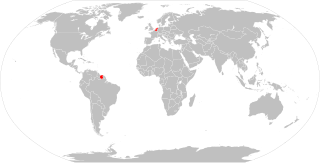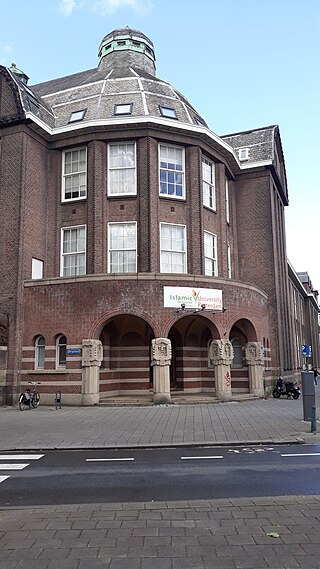Related Research Articles

Flanders is the Dutch-speaking northern portion of Belgium and one of the communities, regions and language areas of Belgium. However, there are several overlapping definitions, including ones related to culture, language, politics, and history, and sometimes involving neighbouring countries. The demonym associated with Flanders is Fleming, while the corresponding adjective is Flemish, which can also refer to the collective of Dutch dialects spoken in that area, or more generally the Belgian variant of Standard Dutch.

The Vrije Universiteit Brussel is a Dutch and English-speaking research university in Brussels, Belgium. It has four campuses: Brussels Humanities, Science and Engineering Campus, Brussels Health Campus, Brussels Technology Campus and Brussels Photonics Campus.

The Dutch Language Union is an international regulatory institution that governs issues regarding the Dutch language. It is best known for its spelling reforms which are promulgated by member states, grammar books, the Green Booklet and its support of Dutch language courses and studies worldwide. It was founded on a treaty concluded between the Netherlands and Belgium on 9 September 1980. Suriname has been an associate member of the Taalunie since 2004.

The transnationale Universiteit Limburg is based in Belgium and the Netherlands. The tUL was founded together by both the Universiteit Maastricht and the Limburgs Universitair Centrum, now Hasselt University as a way to co-operate better.

The Flemish Community is one of the three institutional communities of Belgium, established by the Belgian constitution and having legal responsibilities only within the precise geographical boundaries of the Dutch-language area and of the bilingual area of Brussels-Capital. Unlike in the French Community of Belgium, the competences of the Flemish Community have been unified with those of the Flemish Region and are exercised by one directly elected Flemish Parliament based in Brussels.
Vesalius College, also known as VeCo, is a private college located in Brussels, Belgium. Founded in 1987, it is named after Andreas Vesalius, a pioneering anatomist of the Renaissance period.

Nyenrode Business Universiteit is a Dutch business university and the only private higher education institution that has the university status in the Netherlands. Founded in 1946, it is located on a large estate in the town of Breukelen, between Amsterdam and Utrecht. The educational institution is named after the castle where the course is located: Nijenrode Castle. Nyenrode was founded under the name of the Netherlands Training Institute for Abroad by renowned private Dutch companies, including KLM, Shell, Unilever, Philips, and AkzoNobel, with the objective 'For Business, By Business'. The establishment was the result of an idea from KLM director Albert Plesman.
Dutch universities are supported by state funding so that universities do not have to rely on private funding to pay for tuition. All citizens of the Netherlands who complete high school at the pre-academic level (vwo) or have a professional propedeuse at HBO level, signifying they have finished their first year course, are eligible to attend university. In the case of an HBO-propedeuse some restrictions may apply as to deficiencies in High School subjects. Three universities have restrictive requirements based on academic ability, and all universities have restrictive requirements for some of their programs because the number of prospective students sometimes outnumbers the number of available places.

The International Institute of Social Studies (ISS) of Erasmus University Rotterdam is an independent international graduate school of policy-oriented social science. ISS was established in 1952 by Dutch universities and the Netherlands Ministry of Education. The ISS is located in The Hague, Netherlands.

The Islamic University of Applied Sciences Rotterdam is a vocational university founded in 1997. It is a member of the Federation of the Universities of the Islamic World. The Islamic University of Applied Sciences Rotterdam received her first accreditation in 2010 for her master's degree programme Islamic Spiritual Care (Chaplaincy) and in 2013 for Bachelor program Islamic Theology; both degree programmes are accredited by the NVAO. According to a news article from 2010 the university has close religious ties with the Turkish Nurcu movement. The IUASR offers accredited Bachelors and master's degrees and is called Islamic University of Applied Sciences Rotterdam.
The education in the Flemish Community covers the Dutch-speaking part of Belgium and consists of three networks (netten): government-provided education (gemeenschapsonderwijs), subsidized public schools and subsidized free schools.

The Evangelical Theological Faculty is an interdenominational Evangelical Institute/University in Leuven, Flanders, Belgium and is recognised by the Federal Government of Belgium to award degrees and doctorates. It is an Evangelical faculty which complements the Faculty of Theology and Religious Studies at the Catholic University Leuven. The ETF offers four degree programs: a Dutch-taught Bachelor of Arts in Theology and Religious Studies program, an English-taught Master of Arts in Theology and Religious Studies program, a Dutch-taught Teacher's degree program, and an English PhD program. Moreover, the ETF also offers a Bachelor's and Master's part-time program named ETF Open University.
Hotelschool The Hague is a single sector university of applied sciences in the Netherlands. It was founded and funded in 1929 by the hospitality industry. In 2010, Hotelschool The Hague founded its university wide Research Centre, focusing on interdisciplinary research with a strong practice-oriented focus.
Wittenborg University of Applied Sciences is a Dutch government accredited private Vocational University established 1987 in the centre of the Netherlands, offering bachelor's and master's degrees - vocational education - at higher level.
Hogeschool West-Vlaanderen, almost always shortened to "Howest", is a university of applied sciences in West Flanders, a province of Belgium with five campuses situated in Bruges and Kortrijk.

Leiden University College The Hague (LUC) is a small interdisciplinary Liberal Arts and Sciences honours college, part of the Faculty of Governance and Global Affairs of Leiden University. The institution's curriculums focus on tackling global challenges, such as peace and justice, sustainability, prosperity and diversity.
Higher education accreditation is a type of quality assurance process under which services and operations of post-secondary educational institutions or programs are evaluated to determine if applicable standards are met. If standards are met, accredited status is granted by the agency.

FIBAA is an internationally experiencedagency for quality assurance for programme and system accreditation and certification in higher education. Founded in 1994 by top associations in the Swiss, Austrian, and German business sectors, FIBAA aims to ensure transparency and quality in the education sector. The FIBAA is organized as a non-profit organization. While headquartered in Bonn, North Rhine-Westphalia, Germany, the foundation’s legal seat is in Zurich, Switzerland.
References
- ↑ "Schoolvoorbeld van nutteloze bureaucratie."
- ↑ "Veto : 29 November 2004" (PDF). Veto.be. Retrieved 2013-10-13.
- ↑ "ScienceGuide". Scienceguide.nl. Archived from the original on 2007-10-09. Retrieved 2013-10-13.
- ↑ "ScienceGuide". Scienceguide.nl. Archived from the original on 2007-10-11. Retrieved 2013-10-13.